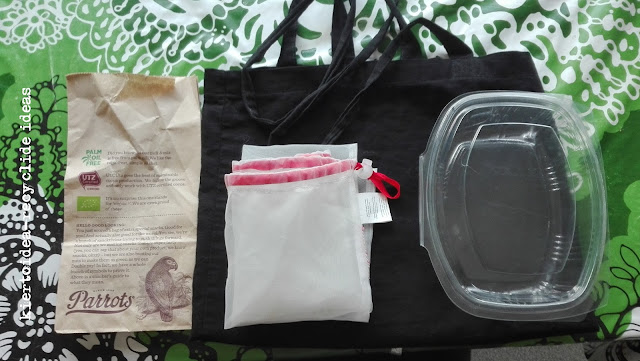Recycled ideas Lea: Almost everything can be reused
- mirkaraberg
- Feb 1, 2022
- 4 min read
Updated: Dec 8, 2022
Lea Ravelin is a Finnish expert of recycled materials and a master of reusing materials. Lea feels that promoting sustainable development and recycling is her life’s mission, so we discussed these topics in an interview. On Instagram, @kiertoidea_recycled_ideas and blog Kiertoidea she shares recycling ideas and craft ideas and advises people on safe reuse.

How did you become interested in these topics?
Recycling and reusing have actually always been part of my life. They probably come from my childhood home, as my parents were really handy. In my childhood, everything was used until the very end, partly also because there was not too much money. Twenty years ago, I lived in a house with no waste transportation. That’s when I really woke up to monitor the generation of waste, because mixed waste really had to be minimised. Today, such a practice would go under the concept of Zero Waste. I read a lot of eco blogs and follow different groups on social media on the topic. I came across this concept of Zero Waste online, and it immediately felt like I had found “soul mates”. I have been writing a blog for 11 years, the idea is to promote circular thinking. At one time at the Habitare trade fair, I was inspired by the content made from recycled goods and the fact that the material would circulate endlessly. I thought that's how it should go. I am also a craftsman instructor by profession and in the training we went through all the different materials and their properties. Since then, I have specialised in the use of recycled materials. I have also studied handicraft teacher studies at the University of Helsinki.
I also use a lot of creativity when I come up with repurposing ideas. For me, it’s one of life’s greatest joys when I wonder what could be made out of this.
How is Circular thinking visible in your life?
We live in an apartment building, so we have really good recycling possibilities. I sort cardboard, paper, plastic, metal and glass. I also export old electrical appliances to stores for recycling. I also actually recycle old items from acquaintances and neighbours. Here in Central Uusimaa, there are three good groups on Facebook where you can give out your stuff for free. I make a lot of use of these groups and I have given and received a lot of all kinds of stuff from there. For example, a friend of mine moved and gave me a lot of stuff, some of which I sold at a flea market. However, at some point I got tired of it and gave the rest away on the Facebook group. As long as I have lived in my own household, I have tried to buy everything second hand. In the 70s, for example, going to flea markets was by no means very trendy. But it did motivate me to shop at the flea market when I could find a Marimekko t-shirt for 50 pence, for example. At school, the guys were wondering where I had gotten nice clothes, but I couldn’t say they were from the flea market. Then visiting flea markets gradually began to become more common.
My friend and I founded KEKO in 2019, the Central Uusimaa Eco Association, and before the corona we organised one exchange market event. The intention would be to arrange them more as the corona wears off. You can bring goods to the exchange market if you wish and take things free of charge. Now, lately, I’ve been trying to prune my own stuff as well, because this kind of recycling craftsman has cabinets full of stuff. I’ve passed on more than 500 items during the year, mostly through the Facebook group. It takes more effort going through the stuff than I could have guessed. It may be easy to decide what you don't need anymore, but getting rid of the goods responsibly is very laborious. For example, pot lids and old books aren't really in demand. As a craftsman, I also repair and alter clothes. Good quality clothes from the flea markets are very affordable, and you can customise them to suit you. In an ecological lifestyle in general, I think it’s essential to think about the whole, and there’s no need to strive for perfection. Finding a sensible balance is important. For example, for 45 years I have acquired almost everything second hand and for 40 years I have not eaten red meat, so the world will not fall if I sometimes use a dishwashing detergent that is not completely ecological.
Kuvat: Lea Ravelin
What kind of skills are needed in repurposing?
Some knowledge of materials is needed. I’m involved in various recycling and craft groups on Facebook and I consider it an important task to warn people about certain materials and give tips on how to use them. For example, in groups, I often warn about the use of VHS and cassette tapes, as they release substances that are harmful to health. Of course, crafts skills make it possible to alter second hand clothes, for example. I also use a lot of creativity when I come up with repurposing ideas. For me, it’s one of life’s greatest joys when I wonder what could be made out of this. The ability to do things yourself, repair things and find what you need cheaply or for free also brings security and a sense of confidence that you will survive if you were to be in a tougher situation financially.










Comments